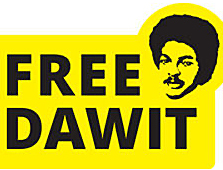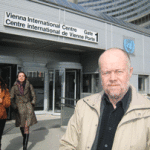VIENNA We need to see more of successful examples in fighting drugs, writes Per Johansson, Secretary general National Association for a Drug-free Society, in this report from UN session Commission on Narcotic Drugs.
There is a long line up to the little booth where I have to go through security check in order to get in to the UN complex in Kaisermühlen on the bank of Danube river in Vienna, Austria. There are demonstrators all along the line with messages like Stop the War on Drugs“, Harm Reduction Saves Lives“ and more of the same kind. One poster is of two persons smoking, one tobacco and one cannabis. What makes us different? The law only!“
 I am in Vienna as an NGO-observer of the great international meeting on drug policy hosted by Commission on Narcotic Drugs, CND, which is a part of the UN system to fight drugs.
I am in Vienna as an NGO-observer of the great international meeting on drug policy hosted by Commission on Narcotic Drugs, CND, which is a part of the UN system to fight drugs.
Chairing the meeting is Nambias Ambassador Selma Ashipala-Musavyi. She goes through formalities and the show can start.
Executive Director Antonio Maria Costa holds – as always – a speech that is wonderful to listen to. If one is against drugs and wants the anti-drug work to develop and become more effective. Costa does not paint a rosy picture of the situation today but points on important achievements. In a 100 year perspective drug production has gone down considerably. Had it not been for the system of international drug control the situation would have been disastrous. During the last few years we can see worldwide addiction to drugs has stabilized. But containing the problem is not solving it.
 What shall we do? asks Costa. He answers: Avoid extreme postions. It is true that drugs kill but governments should not kill because of them. The other extreme comes form a vocal pro-drug lobby. They say that the harm from drug control is larger than the harm from drugs and therefore they want to legalize. Namely, according to Costa, toss the proverbial baby out with the bath water!
What shall we do? asks Costa. He answers: Avoid extreme postions. It is true that drugs kill but governments should not kill because of them. The other extreme comes form a vocal pro-drug lobby. They say that the harm from drug control is larger than the harm from drugs and therefore they want to legalize. Namely, according to Costa, toss the proverbial baby out with the bath water!
Costa wants to see an approach based on the fact that drugs are not harmful because they are controlled – they are controlled because they are harmful. There must be actions taken at both the beginning of the drug cycle as well as at the end. There must be much more effective efforts against crime and corruption. Many governments do not take these problems seriously enough and thus have large problems. Some people are drawn towards legalization as a solution to this situation. Costa prescribes stronger implementation of existing crime control agreements.
There were speeches representing groups of nations organized by the continents of the world. All of them stood up clearly for the UN system, but not the person representing EU, Ivan Langer, Minister of the Interior in the Czech Republic. He spoke about the UN system had failed to reach its goals and he promoted harm reduction as a solution. I spoke later to a person with insight in the preparations of the conference and said I didnt like the speech. Well, you should have seen what it looked like earlier. This was a very modest version.“
 Luckily the Swedish Minister of Public Health, Maria Larsson spoke as one of the first country representatives when the regional speakers had finished. Maria Larsson made it clear that she thinks that some people use the fight against HIV as an excuse to lower the ambitions in our fight against drug abuse. We must fight both problems! She also made a strong point about the level of ambitions. Unless we set high goals for our work we wont reach far in our work. Expectations determine the outcome. It might not be easy to reach high goals but it is definately possible.
Luckily the Swedish Minister of Public Health, Maria Larsson spoke as one of the first country representatives when the regional speakers had finished. Maria Larsson made it clear that she thinks that some people use the fight against HIV as an excuse to lower the ambitions in our fight against drug abuse. We must fight both problems! She also made a strong point about the level of ambitions. Unless we set high goals for our work we wont reach far in our work. Expectations determine the outcome. It might not be easy to reach high goals but it is definately possible.
At a reception at the Swedish Embassy the evening before the CND opening, in honor of Queen Silvia of Sweden, Director Costa spoke about Sweden and the results of its policies. UNODC some years ago made a list of over 180 nations, ranking them as to the level of their drug problem. For unknown reason this list was never published. Sweden was ranked as number 168, nr 1 being the nation having the largest problems.
 Queen Silvia spoke at the reception as well as at the opening of CND. It comes natural she did not make any controversial statements. Her general message was we should never stop to fight drugs and the harms that drugs cause. At the reception she made an unprepared remark about how her children (young adults) have come to meet drugs on clubs and such. They had told her that the general attitude among young people is that drugs are looked upon as a matter of personal choice. The Queen commented and said she is against that attitude. It is a responsibility for all society to try to change that attitude.
Queen Silvia spoke at the reception as well as at the opening of CND. It comes natural she did not make any controversial statements. Her general message was we should never stop to fight drugs and the harms that drugs cause. At the reception she made an unprepared remark about how her children (young adults) have come to meet drugs on clubs and such. They had told her that the general attitude among young people is that drugs are looked upon as a matter of personal choice. The Queen commented and said she is against that attitude. It is a responsibility for all society to try to change that attitude.
Representatives from countries from all over the world held short speeches in the plenary session. Ive mentioned Swedens speech. I listened to many more. I will not bore you with all of them.
Here are some quotes:
• Burkina Faso talks about how drugs and drug trafficking is a threat to his countrys economic and social development. Countries in West Africa are in a very vulnerable situation.
• Brazil: drug-free world unattainable and has led to negative consequences such as violence and large prison populations. The answer: Harm reduction!
• USA: Columbia has showed tremendous commitment to fight drugs. We owe it to ourselves and to Afghanistan to help that country to fight opium production.
• Colombia: I dont want my children or any other children to enter the maelstrom of drug abuse. I want to see a world free from drug abuse.
• Chile: In drug courts addict are sentenced to treatment instead of prison. We also have treatment programs in prisons. We have been able to contain cocain abuse. Low level of heroin abuse. Marijuana is growing. New strategy is on the way with a stricter approach. There is political consensus abut this in Chile.
The countries are pretty close in theory, with some exceptions. There is a strong consensus that we must fight the drug problem on both the supply and demand end. Then nations draw very different conclusions. Some want to loosen control (very much an EU approach with friends in some other parts of the world). Others (the majority of nations obviously) want to develop the work of international control and want to see a stronger UNODC.
My personal conclusion is that we need to see more of successful examples. The proof of the pudding is in eating it. Sweden has important experiences that we should be better at sharing. Maybe some should be better at listening also. Other nations should come out on the international scene with good examples of success. Why should those nations that have failed set the agenda for the world? I just cant get that in to my head.




